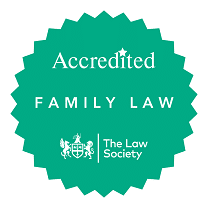Do you need advice from an Accredited Family Law Solicitor in Chester?
We know that divorce is a difficult and emotional experience and the importance of getting the right divorce solicitor during divorce proceedings cannot be over-emphasised.
Our family law solicitors will ensure that our clients are certain that this is what they want and we spend time with them considering and advising upon their options.
So, if you need a family law solicitor, why not book a free, no-obligation initial consultation today with the family law experts at Freeman Jones Solicitors and find out how we can help you in your time of need?
We are Accredited Family Law Solicitors as recongised by The Law Society

Contact Colin Freeman first on 01244 506 444 or fill in our enquiry form.
Hear what our clients have to say about our family law solicitors

Family Law Solicitors Chester: What to consider
We understand that many disagreements and issues can arise during a divorce. Common examples are money disputes, child care arrangements, maintenance provisions, pension sharing and sharing/selling your home.
So if you need a solicitor for family law, Freeman Jones Solicitors can provide specialist legal advice to help guide you through either the divorce process or any other family law issues.
There are many things to consider when starting divorce proceedings and so it is important to understand the process. You will also need to deal with the financial side of the divorce, which involves dividing the assets and liabilities of the marriage. In many cases the children are also of paramount importance. These areas of family law can be complex but are almost unavoidable during divorce proceedings.
As leading family lawyers in Chester, we have specialist divorce solicitors that can provide expert legal advice for all these issues. Although it is true that divorce and children do not combine well, a non-confrontational and constructive approach to divorce cases reduces the impact on children, and is often the best and cheapest way of resolving the issues between the parties. We also have experience and can help with any issues of domestic abuse and violence.
Where possible, we try and encourage out of court solutions and will give you the advice to enable this to happen.
However, rest assured, our experienced and personable team of family law solicitors will fight for your share of the marriage assets, whether your personal situation is relatively simple or highly complex involving substantial property, pensions, and business interests.
FAQ’s About Family Solicitors and Divorce
We recognise that the separation process flags up a lot of questions as you try to come to terms with what has happened and navigate through various issues that arise from the breakdown of your relationship.
This can be especially difficult where you and your spouse cannot agree on how finances are to be divided, what the arrangements should be for your children and how to deal with shared assets, pensions, and the family home.
Advice from an experienced separation family solicitor can be invaluable in both protecting yourself and achieving a fair settlement allowing you to move on with the next chapter of your life.
We now breakup the various elements of family law and separation and answer some of the common questions raised.

Family Law FAQ’s
-
A family solicitor is able to advise you on the best solution in your case as well as explain what your legal rights are. The areas that fall under family law include
- Divorce
- Financial matters Arising From Divorce
- Children matters (Contact orders, Residence Orders more recently called Child Arrangement Orders)
- Domestic abuse (non-molestation orders and occupation orders);
- Cohabitation, agreements, rights, and disputes
- Change of name deeds;
- Wills;
- Guardianship.
-
A family solicitor is a person who acts on matters such as divorce and separation, financial settlements, child contact, child residence, child arrangement orders, domestic violence, and cohabitation matters. A family law solicitor is able to advise you on such matters and provide you with the best legal advice to ensure that your matter is dealt with effectively.
-
Family law can be complex and with case law changing all the time it is good to have a family solicitor who can advise you on the correct law and procedure.
It is also good to have an experienced family solicitor on your side to ensure that you achieve the best possible outcome for your case.
-
Finding a good family and divorce solicitor is very important. You can speak to friends and family to find out if any of them have had a good experience with a solicitor or law firm or alternatively you can do your own research.
A good family solicitor will usually have a good track record and reputation as well as good reviews (see below on choosing the best solicitor near you).
-
Family law deals with challenging issues that people can experience in their lifetime which are stressful. It is therefore not only important that you choose a solicitor that understands your case and that you feel comfortable communicating with, but also that has the experience to best represent your interests in the case.
For a number of years now our Mr Freeman (who is predominantly based at our Chester office) has been recommended by independent companies as one of the best family law solicitors and best divorce solicitors in that area but he also serves clients throughout the UK. In addition Mr Freeman receives many positive reviews for his work in this area and he heads up the Family Law Department.
-
Fees for family law depend upon the complexity of your case and the extent to which you are in dispute with the other party. In short it depends on how much time a solicitor is required to spend on your file which will be far less if everything is agreed (and just needs court approval) than if you are in dispute and contested court proceedings are required.
At Freeman Jones Solicitors for some types of cases we can offer family law fixed fees as well as the usual private fee basis of funding your case. At the outset of every case we provide a cost estimate in order that you have some idea of the cost of our service.
-
When preparing to speak to a solicitor you may feel nervous; however, a solicitor’s job is to try and put you at ease.
You should be prepared for the solicitor to ask you personal questions and ask about specifics in relation to your particular situation. This way the solicitor can give you tailored advice. A solicitor needs to be able to understand your personal situation if they are to advise you well.
Likewise, when speaking to a solicitor you should be honest as a solicitor cannot act in your best interests if they do not know the full story.
You should tell your solicitor what your priority is or what your end goal is and the solicitor can effectively analyse your case to see whether that is likely.
-
Eligibility for UK divorce required the parties to have been married or in a civil partnership for a period exceeding 12 months.
If you cannot comply with this then you may apply to annul the marriage provided you and your spouse have either lived in England and Wales or at least a year or have had a permanent home in England and Wales for at least six months. For annulment (also known as “nullity”) you will need to show the marriage was never legally valid and is therefore void or was legally valid but meets one of the reasons that make it voidable.
-
You can, in theory, file a divorce petition using the online portal without instructing a separation solicitor to represent you.
Financial settlements on divorce are more complex and we would strongly advise you to take legal advice in relation to financial settlement and who can answer in detail specific to your circumstances the usual questions our clients tend to have including, but not limited to:
- What am I entitled to in a divorce?
- What is a divorce financial order?
- What is an interim financial order?
- What is a consent order?
- What is a clean break order?
- What if we cannot reach a financial agreement?
- What is the divorce court process?
- What happens to the house in a divorce?
- How is pension split in divorce?
- What is divorce financial disclosure?
- What happens to the children?
-
When getting divorced there are a number of stages to consider which usually comprise:
- The divorce process itself;
- Dealing with the financial settlement divorce process;
- Resolving any arrangements for children (to be dealt with separately from the divorce and divorce financial settlement).
-
The average time it takes to get divorced in the UK depends on whether a divorce is contested or uncontested.
For example, uncontested divorces during 2024 ranged between 7 to 8 months to compete. While contested divorces could take years for more complex cases.
Additionally, divorces involving a financial settlement may also extend the length of time it takes to resolve a divorce proceeding.
-
There are two types of divorce costs you need to bear in mind for uncontested divorces; these are court and solicitor fees. Fixed court fees in the UK is currently £593. While divorce solicitors can range from £500 to £1500.
However, if your divorce is a contested one, fees for both can be significantly higher as more court hearings and legal aid may be required to resolve disputes between both parties.
-
There are generally eight stages to the divorce process:
- The divorce process starts with one party preparing a draft divorce petition setting out the legal reasons upon which they rely for divorce;
- The divorce petition is submitted to the court either online or by post with the court fee;
- The divorce petition is issued by the court and sent to the other spouse;
- The spouse files a document called an “acknowledgement of service” confirming whether they wish to defend or consent to the divorce;
- The person who prepared the divorce petition (the “Petitioner”) applies to the court for Decree Nisi;
- The court pronounces Decree Nisi (the parties do not normally have to attend court for this);
- Six weeks after Decree Nisi the next stage is to apply for Decree Absolute;
- Application for Decree Absolute.
Take a look at our Divorce Process Flowchart for a more visual overview.
-
We often see some confusion as to the differences between a divorce and dissolution of a civil partnership. Both are very similar in the sense that they are both legally recognised relationships, however civil partnerships typically tend to be more popular amongst same-sex couples.
In the event of a breakup, they both involve a court process in which the divorce or dissolution can take place. Whilst both processes are almost identical, there does exist some slight variations within the legal terminologies and it must also be noted that, for a civil partnership dissolution, a legal separation cannot be granted based solely on the grounds of adultery.
-
In recent years there has been a massive reduction in the availability of legal aid not only in Family Law but in many others. Legal aid is now only available for very specific types of cases which normally include domestic abuse, a child’s welfare including social services, and some types of injunctions.
The Legal Aid Agency assess your eligibility for funding if your case falls into one of the above criteria or other areas where legal aid is available. As a firm we do not have a legal aid contract and are unable to offer legal aid to our clients.
-
A divorce petition is a court form that needs to be completed to start the divorce process. Once it has been completed it is sent to the court for issue together with the court fee. The person completing the divorce petition is known as the Petitioner and the person who receives it from the court once it has been issued is called the Respondent.
The divorce process can take approximately 18-22 weeks to conclude but is normally also linked to financial divorce settlement.
-
Following no fault divorce consultation, no fault divorce should be introduced in late 2021. Blameless divorce has been discussed for some time now. Until the introduction of that, when preparing a divorce petition, one of five reasons must be stated which demonstrate that the marriage has irretrievably broken down.
- Adultery (to be either admitted or proven). This reason is not available for civil partnerships and same sex marriages;
- Unreasonable behaviour. This is by far the most common reason. Whilst unreasonable behaviour divorce requires details to be stated in the petition, the other party does not have to admit it.
- Separation – two years. Parties must have lived apart for two years and consent to this reason;
- Separation – five years. Separation after five years does not require the consent of the other party;
- Desertion. Whilst desertion is another ground for divorce it is rarely used and has to amount to more than mere separation.
-
We sometimes get asked “can you get a divorce without a financial settlement?” Whilst the answer is technically yes, it is often not the best advice. To resolve the issue of the financial aspect of the marriage you must reach a financial settlement which normally results in a divorce consent order (where the parties agree) or a divorce financial order imposed by the court. A court order can be obtained in order to ensure there is a legally binding court order. If one party does not comply with the financial order then advice can be taken upon enforcement.
-
A clean break order is an order made by the court to settle all financial matters between you and your former spouse.
It is important for both parties to be aware that no future claims can then be made. Essentially, the order severs any financial commitments between you and your former spouse.
The court must consider whether a clean break is appropriate when making any financial order. It may not be appropriate if, for example, there are children of the marriage. However, it may be appropriate if there are no children, you and your former spouse are of a similar age and have a similar earning capacity.
-
In the event of a divorce or dissolution, each party possesses a legal right to live in the family home unless there exists a prenuptial agreement which states otherwise when matters become more complex.
It should be noted that, even if one person appears on the mortgage and title deeds, this does not entitle them to 100% occupation of the property or its value. Both parties possess a legal share of the assets which is recognised by the law governing family law.
When it comes to deciding what happens to the house in a divorce, this is a decision which can be agreed upon outside of court and then approved by the court; or, alternatively, if an agreement cannot be made, then the court shall make a decision on their behalf based on a number of factors set out in section 25 of the Matrimonial Causes Act 1973.
-
When dividing assets on divorce the court looks are the following mattes which are set out in Section 25 of the Matrimonial Causes Act 1973 (“MCA”)
The general factors for consideration under S25 MCA are as follows:-
- The income, earning capacity, property, and other financial resources each of the parties has or is likely to have in the foreseeable future, including in the case of earning capacity any increase in that capacity which it would in the opinion of the court be reasonable to expect a party to the marriage to take steps to acquire;
- The financial needs, obligations, and responsibilities which each of the parties to the marriage has or is likely to have in the foreseeable future;
- The standard of living enjoyed by the family before the breakdown of the marriage;
- The age of each party to the marriage and the duration of the marriage;
- Any physical or mental disability of either of the parties to the marriage;
- The contributions which each of the parties have made or is likely in the foreseeable future to make, to the welfare of the family, including any contribution by looking after the home or caring for the family;
- The conduct of each of the parties, if that conduct is such that it would in the opinion of the court be inequitable to disregard it;
- In the case of proceedings for divorce or nullity of marriage, the value to each of the parties to the marriage of any benefit which, by reason of the dissolution or annulment of the marriage, that party will lose the chance of acquiring.
Common misconceptions about divorce
There are also many popular misconceptions about divorce proceedings.
Here are some of the most common ones:
-
This is untrue, you and your partner must have been married for a year or more to start divorce proceedings. However, if you believe that your marriage should never have been a legal marriage, the court can ‘annul’ it, meaning that legally, the marriage never happened.
-
This is incorrect as many clients want an amicable divorce and manage to achieve this. Defended divorces are relatively infrequent.
-
This is untrue. Unless you and your partner have lived apart for over two years, all divorce settlements have to be based on either unreasonable behaviour or adultery, the most common being unreasonable behaviour.
-
This is incorrect, if one party begins a physical relationship with another person before the decree absolute has been pronounced, they are committing adultery.
-
Although this is the most common agreement, this is not always the case. If both parents have an equal position in caring for the children, then no presumption would be made in favour of the mother of the children.
-
There isn’t a common law spouse, no automatic rights are acquired when an un-married couple are cohabitating.
Related Family law articles




Book Your Free, No-Obligation 20-Minute Consultation Today!
"*" indicates required fields

